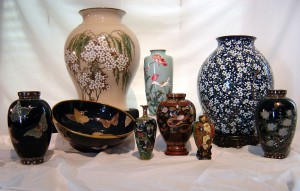 Scripps College will receive nine pieces of fine Japanese cloisonné enamel from the Anthony and Patricia Ghosn collection, donated by R. Scott and Lannette Turicchi, in coordination with the Worldbridge Foundation. As part of the Scripps art collection, stewarded by the Ruth Chandler Williamson Gallery, the pieces will enhance teaching and research at the College.
Scripps College will receive nine pieces of fine Japanese cloisonné enamel from the Anthony and Patricia Ghosn collection, donated by R. Scott and Lannette Turicchi, in coordination with the Worldbridge Foundation. As part of the Scripps art collection, stewarded by the Ruth Chandler Williamson Gallery, the pieces will enhance teaching and research at the College.
Cloisonné, an art form in decorating metalwork objects with enamel (kiln-fired colored glass or ground semi-precious stone) used in ancient times in the Middle East, made its way to Asia via trade routes in the 1300s. Japanese artists perfected the art form during the Meiji period from 1868 to 1912, reaching heights of distinction and subtlety resulting in extraordinary examples of the blending of craftsmanship and art. These artists, with endless patience, would execute pictorial scenes using wire work and shaded enamels resembling the brush strokes of paintings with similar themes. This work would then be fired in a kiln and highly polished creating works of art that rival Faberge and other European enamelists.
Williamson Gallery Director Mary MacNaughton said: “These exquisite cloisonné works will enrich students’ understanding of material culture in Japan. We are grateful to R. Scott and Lannette Turicchi as well as Anthony and Patricia Ghosn and the Worldbridge Foundation for giving students the opportunity to study these superb objects.”
Bruce Coats, professor of art history and humanities at Scripps, noted that “to have such extraordinary and varied cloisonné pieces from Japan allows our students to understand how such works were designed, produced, and marketed, with Japanese, European, and American collectors in mind. These remarkable Japanese creations join a fine collection at Scripps College of Chinese cloisonné from the 16-20th centuries, so students now can compare the aesthetic and technical qualities of two competing centers of production. Students will also be able to combine these nine Japanese cloisonné pieces in exhibitions with paintings, prints textiles, and ceramics to demonstrate how design elements transcend materials and create a visual vocabulary that speaks of love, longing, and the passage of time.”
A student-curated exhibition featuring the cloisonné enamels will open in mid-November 2011 on the Scripps campus.
Anthony Ghosn of WorldBridge said: “We are thrilled to have these pieces of Japanese cloisonné enamel in a public venue for academic study and exhibition purposes. The art and science behind the making of these objects tells a story of Japanese artistic ability used to promote the nation on a global stage through exhibitions in late 19th and early 20th century world fairs. We are grateful to the Turicchis for their support of cross cultural education through the arts as a primary theme in their overall philanthropic activities. Their appreciation for the impact of the cultural shifts in Meiji Japanese history and the related arts of that time as important areas for study and exhibitions will enlighten many students of art history and other disciplines for years into the future.”
The Ruth Chandler Williamson Gallery is located at Eleventh Street and Columbia Avenue, adjacent to Baxter Hall. During exhibitions, the gallery is open to the public, free of charge, Wednesday through Sunday, from 1-5 p.m. For more information, please contact the gallery at (909) 607-3397 or visit the website at www. rcwg.scrippscollege.edu.
* * * * * *
Scripps College, founded in 1926, is a nationally top-ranked liberal arts college and a member of The Claremont Colleges. With approximately 950 students, Scripps College offers an intense learning experience with small classes on a campus famous for its beauty. As part of a consortium with four other colleges in immediate proximity and two graduate institutions, Scripps offers its students the benefits of a larger university, with shared facilities, co-curricular activities, and ability to cross-register at any or all of the colleges. The mission of the College is to develop in its students the ability to think clearly and independently, and the ability to live confidently, courageously, and hopefully.
R. Scott and Lannette Turicchi support philanthropic efforts in art, culture, religion and the humanities for educational purposes where people can better understand how their own cultures influence their life purpose. Mrs. Turicchi runs Falling Upwards Productions, LLC, which produces short subjects and documentary films. Her most recent work is a documentary entitled “The Prophet” which is about the life of Pope John Paul II, emphasizing the cultural aspects that impacted him as both a Pope and a world leader. Mr. Turicchi is a corporate executive from the investment banking industry and currently is the president at j2 Global Communications, Inc., in Los Angeles. Mr. Turicchi is a graduate of Claremont McKenna College.

